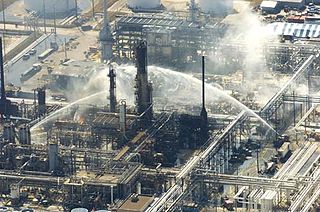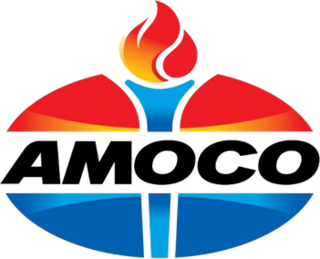
Amoco Corporation is a global chemical and oil company that was founded in 1889 around a refinery located in Whiting, Indiana, United States. Originally part of the Standard Oil Trust, it focused on gasoline for the new automobile market. In 1911, during the break up of the trust, it became an independent corporation. Incorporated in Indiana, it was headquartered in Chicago.

Texas City is a city in Galveston County in the U.S. state of Texas. Located on the southwest shoreline of Galveston Bay, Texas City is a busy deepwater port on Texas' Gulf Coast, as well as a petroleum-refining and petrochemical-manufacturing center. The population was 48,558 in 2017, making it the third-largest city in Galveston County, behind League City and Galveston. It is a part of the Houston metropolitan area. The city is notable as the site of a major explosion in 1947 that demolished the port and much of the city.

An oil refinery or petroleum refinery is an industrial process plant where crude oil is transformed and refined into more useful products such as petroleum naphtha, gasoline, diesel fuel, asphalt base, heating oil, kerosene, liquefied petroleum gas, jet fuel and fuel oils. Petrochemicals feed stock like ethylene and propylene can also be produced directly by cracking crude oil without the need of using refined products of crude oil such as naphtha.
Koch Industries, Inc. is an American multinational corporation based in Wichita, Kansas. Its subsidiaries are involved in the manufacturing, refining, and distribution of petroleum, chemicals, energy, fiber, intermediates and polymers, minerals, fertilizers, pulp and paper, chemical technology equipment, ranching, finance, commodities trading, and investing. Koch owns Invista, Georgia-Pacific, Molex, Flint Hills Resources, Koch Pipeline, Koch Fertilizer, Koch Minerals, Matador Cattle Company, and Guardian Industries. The firm employs 120,000 people in 60 countries, with about half of its business in the United States. The company is the largest landowner in the Athabasca oil sands.
Andeavor was a Fortune 100 and a Fortune Global 500 company headquartered in San Antonio, Texas, with 2017 annual revenues of $35 billion, and over 14,000 employees worldwide. Based on 2017 revenue, the company ranked No. 90 in the 2018 Fortune 500 list of the largest United States corporations by total revenue.

A relief valve or pressure relief valve (PRV) is a type of safety valve used to control or limit the pressure in a system; pressure might otherwise build up and create a process upset, instrument or equipment failure, or fire. The pressure is relieved by allowing the pressurised fluid to flow from an auxiliary passage out of the system. The relief valve is designed or set to open at a predetermined set pressure to protect pressure vessels and other equipment from being subjected to pressures that exceed their design limits. When the set pressure is exceeded, the relief valve becomes the "path of least resistance" as the valve is forced open and a portion of the fluid is diverted through the auxiliary route. The diverted fluid is usually routed through a piping system known as a flare header or relief header to a central, elevated gas flare where it is usually burned and the resulting combustion gases are released to the atmosphere. As the fluid is diverted, the pressure inside the vessel will stop rising. Once it reaches the valve's reseating pressure, the valve will close. The blowdown is usually stated as a percentage of set pressure and refers to how much the pressure needs to drop before the valve reseats. The blowdown can vary from roughly 2–20%, and some valves have adjustable blowdowns.
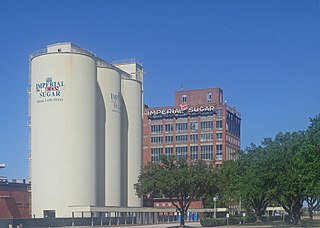
Imperial Sugar is a major U.S. sugar producer and marketer based in Sugar Land, Texas, with sugar refinery operations in California, Georgia, and Louisiana. The company was established in 1843 and has undergone ownership changes multiple times. The current name, Imperial Sugar Company, was established after a change in ownership in 1907. The company went through major expansion through acquisitions beginning in 1988, but filed for bankruptcy in 2001, emerging in the same year and embarking on a downsizing strategy. As of May 2012, the company was in the process of being purchased once more and converted from a public to a private company by Louis Dreyfus Group of the Netherlands.
Phillips Petroleum Company was an American oil company incorporated in 1917 that expanded into petroleum refining, marketing and transportation, natural gas gathering and the chemicals sectors. It was Phillips Petroleum that first found oil in the North Sea, at a position they called Ekofisk, announced 23.December 1969
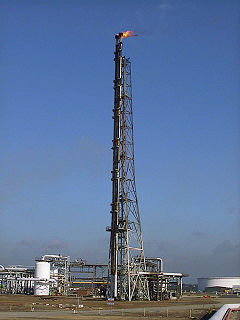
A gas flare, alternatively known as a flare stack, is a gas combustion device used in industrial plants such as petroleum refineries, chemical plants, natural gas processing plants as well as at oil or gas production sites having oil wells, gas wells, offshore oil and gas rigs and landfills.

PetroVietnam is the trading name of Vietnam Oil and Gas Group (PVN). PetroVietnam has developed rapidly since it was established in 1977, and its activities, through its various companies and wholly owned subsidiaries, now cover all the operations from oil and gas exploration and production to storage, processing, transportation, distribution and services. Wholly owned by the Vietnamese central government, it is responsible for all oil and gas resources in the country and has become its country's largest oil producer and second-largest power producer.

The U.S. Chemical Safety and Hazard Investigation Board, generally referred to as the Chemical Safety Board or CSB, is an independent U.S. federal agency charged with investigating industrial chemical accidents. Headquartered in Washington, D.C., the agency's board members are appointed by the president and confirmed by the United States Senate. The CSB conducts root cause investigations of chemical accidents at fixed industrial facilities.
Diesel engine runaway is a rare condition affecting diesel engines, in which the engine draws extra fuel from an unintended source and overspeeds at higher and higher RPM and producing up to 10 times the engine's rated output until destroyed by mechanical failure or bearing seizure through lack of lubrication.
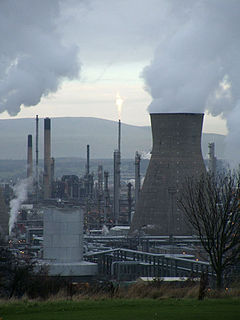
Grangemouth Refinery is a mature oil refinery complex located on the Firth of Forth in Grangemouth, Scotland. Currently operated by Petroineos, it is the only crude oil refinery in Scotland and currently one of six in the UK. It is reputedly the UK's second-oldest refinery, and it supplies refined products to customers in Scotland, northern England and Northern Ireland, as well as occasionally further afield.

BP plc is a British multinational oil and gas company headquartered in London, United Kingdom. It is one of the world's seven oil and gas "supermajors", whose performance in 2012 made it the world's sixth-largest oil and gas company, the sixth-largest energy company by market capitalization and the company with the world's 12th-largest revenue (turnover). It is a vertically integrated company operating in all areas of the oil and gas industry, including exploration and production, refining, distribution and marketing, petrochemicals, power generation and trading. It also has renewable energy interests in biofuels, wind power and solar technology.

The Chevron Richmond Refinery is a 2,900-acre (1,200 ha) petroleum refinery in Richmond, California, on San Francisco Bay. It is owned and operated by Chevron Corporation and employs more than 1,200 workers, making it the city's largest employer. The refinery processes approximately 240,000 barrels (38,000 m3) of crude oil a day in the manufacture of petroleum products and other chemicals. The refinery's primary products are motor gasoline, jet fuel, diesel fuel and lubricants.
On February 1, 2015, United Steel, Paper and Forestry, Rubber, Manufacturing, Energy, Allied Industrial and Service Workers International Union announced that "more than 5,200 USW Oil Workers at 11 refineries in California, Indiana, Kentucky, Ohio, Texas and Washington are on strike against the industry’s unfair labor practices". The list of charges alleged by NSW filed with the NLRB included: bad-faith bargaining over the companies’ refusal to negotiate over mandatory subjects, impeded bargaining for the companies’ undue delays in providing information, threatening workers if they join the ULP strike and others. As of March 3, 2015, about 6,550 workers were on strike at 15 plants, including 12 refineries with a fifth of U.S. capacity. It was the first time since 1982 that U.S. oil workers have walked off their jobs to protest working conditions. The National Oil Bargaining talks began in 1965 and are part of the U.S. oil industry's Pattern bargaining process.


